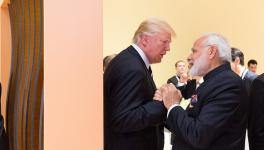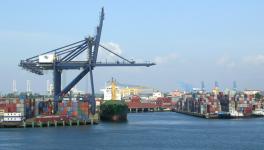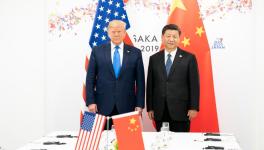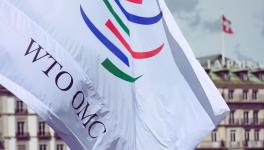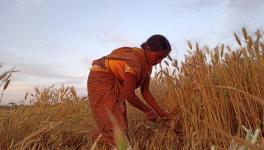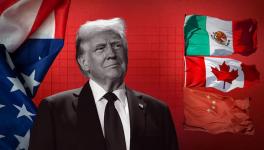Flawed Global Rules in Agriculture: Need for a New Approach
Sophia Murphy, from the Institute for Agriculture and Trade Policy (IATP) speaks with Newsclick on how for the past 20 years, the World Trade Organisation (WTO) Agreement on Agriculture (AoA) has failed to address basic inequities in world agriculture. Subsidies, dumping of agriculture products by the North and market concentration continue unabated. The current crisis at the WTO, the emergence of bilateral and mega Free Trade Agreements (FTAs) such as the Trans Pacific Agreement (TPP) have further complicated the urgent issue of fundamental reform of agriculture trade rules. What is urgently required is a new framework for global agriculture that embraces principles of agro-ecology, remunerative prices, sustainable livelihoods and ecological sustainability. We need reforms and subsidies that benefit peasants, not agribusiness.
Benny Kuruvilla: Hello and welcome to Newsclick and the Real news network. Today we are in
conversation with Sophia Murphy who is the Senior Advisor at the Institute for Agriculture and Trade
Policy and we will speak with her about global trade politics in agriculture, especially the impact of US
policy on developing countries.
Sophia welcome to Newsclick. In terms of global agriculture, you had the creation of the WTO in
1995 and the reason why developing countries agreed to the agreement on agriculture
was mainly for two reasons. One, is that they would get access to markets in the north
and the trade distorting subsidies prevalent in the US and the European Union would be
addressed through various mechanisms. Two, decades down the line what is the
record?
Sophia: From a lot of developing countries’ point of view the record is very disappointing and
there are two answers in a way to the question. The first answer is that although the
way in which support is provided in the US and the European Union especially the way
they do that has changed the amounts of money involved have not really changed and
some of the distorting effects in markets have not changed at all. A lot of tariffs have
come down but not on specific products which are of great importance to the South,
cotton, rice, sugar. On the other hand the who is buying, and what’s happening in
markets has changed enormously. So you see a great rise in the importance of
reservation in the importing markets, we’ve seen some shifts where some developing
countries particularly the big exporters like Brazil, Argentina who have large land areas
and historically have surplus food, they have definitely been able…the amounts of food
that is traded has grown and the share of some parts of the South in that has changed,
has grown as well. But it’s very few countries: China, Brazil, you could probably name
them on one hand.
Benny: Part of your recent work has been to look at the global commodity prices and your
recent paper, for instance, talks about the decline in commodity prices which has led to
the US dumping products in the South. Can you talk about which are the countries that
are impacted? Who are the main players?
Sophia: Well just to put a context on the prices, so the Uruguay Round, the impetus from the
developed countries’ side, it was to try and stop the destabilizing effects of export
subsidies and they were worried about over production and for a long time the Uruguay
round failed to stop that. Prices continued to decline. More recently we had a big price
spike and that created a lot of volatility in the international markets and disrupted
things. For a brief period the historic phenomenon of dumping which was that the US
would, say, it would cost five dollars to raise a bushel of wheat and they would sell it
abroad one at four or three-fifty thereby bringing prices down for everyone. That held
off for a while, while prices were high, but as prices had begun to come down again, as
production had increased, prices were going down and dumping has reasserted itself
because all of the same support that was there for the farmers before in the US
continues and there is nothing to stop them producing. The dumping affects developing
countries in different ways, it’s hard to generalize, it depends on the economy how large
or small, how much you import, but the prices affected are in staple foods.
Benny: India for instance, what is the impact on India? Has the Indian Government responded to
this?
Sophia: I think the Indian Government, a lot of the time in the trade context dumping is
something seized upon by other exporters who want the market that those with lower
prices are capturing and occasionally the importing countries see their prices
depressed. But India is self sufficient in these grains and where the US focuses its
support India is self sufficient and even occasionally a big exporter and has been…So
historically governments hav’n’t been really…they see the injustice but it is much easier
to focus on subsidies. Dumping is a slightly more complicated problem because of
concentration of market powers that the private grain traders have in international
markets and they …some of the economics of agriculture where farmers assume a lot of
costs. They end up in a way subsidizing their own production. So they work at the jobs
on the farm or they may sell their labor elsewhere, they will forego a normal return , in
the US of course it would be a very different thing from what it would be in India but it
is common to agriculture to keep the land in production and to keep the long term
project going . They will absorb losses to a significant extent within the household and in
its own way that happens in the US. So the dumping is spread out and I think mostly the
result of the structure of the market and the lack of competition among the big grain
traders and the lack of equal bargaining power between the sellers and the buyers.
Benny: You are saying that within the international trade arena it’s a very complex issue to
address but within the US itself in terms of the Farm Bill which the organization has
been monitoring quite closely, are there efforts to reform current policy?
Sophia: Big efforts to reform US farm policy. They come from all sides of the political spectrum.
There are people who object to the cost of the very expensive program in the budget.
There are groups that object to the health outcomes, that we are subsidizing crops that
are not particularly nutritious, perpetuate poor diet subsidies. There are
environmentalists who are very concerned about the lack of…that there is no
accounting for the so called externalities: water use, soil health, downstream pollution
resulting from pesticides were a lot of environmental issues that are not addressed in
the farm bill or that are addressed in a small way but there’s nothing done at source to
try and encourage or even oblige farmers to meet higher standards, to pay more
attention. But the…and the farmers complain as well about they get but those formats
pull in slightly different directions. And it’s been very difficult to come to agreements
and then there is the political power especially for cotton, some of the crops that are in
a geographically small area, the concentration of political power where they will have
the Congress, our government that is closely attached to the interests there so it
becomes politically difficult to bring change. So the history of the last twenty years of US
performance is lots of new programs, I can give you twenty acronyms, twenty ways in
which you try to either support income or support production but then are the facts
which is what we are trying to capture with the dumping numbers that you are
continuing to put product in the international market at less than the cost to produce
even before you look at environmental costs and some of these other concerns.
Benny: So part of these interests continue to get entrenched because the WTO is no longer the
vehicle for trade liberalization and you have the US pushing in Trans-Pacific partnership,
Trans-Atlantic trade and investment partnership and in Asia you have the Regional
Comprehensive Economic Partnership the RCEP, now what does this entail for a fair
global agricultural trade framework? And what is it that Southern countries should be
doing to ensure that these things are back on the table?
Sophia: So I think … as someone described to me recently that the Trans-Pacific partnership is
basically a trade agreement for global value change. It takes every part of that, the
competition rules you need, the investment rules, the services, the IP, all of these
elements, intellectual property, all of that, so the ambition of that agreement is that you
are going to re-organize where things are produced and sold according to a more logical
co-efficient you know distribution. And the very alarming thing for those of us who are
worried about livelihood, who are worried about equity and justice issues is that it’s
not…our experience of those global value changes is that they have created
opportunities for a certain number of people especially people in the right place to
some extent at the right time and especially those who have government support but a
lot of people in the south of that model you are not near the urban center, you are not
in the airport or the shipping port, you are not producing enough to consistently satisfy
contractors so you don’t get the contract so it leaves the governments and these more
marginal producers, there are hundreds of them outside of where the money and the
capital investment is all going. So I am starting to play with the idea if that’s the global
value change agreement then do we need a trade agreement that’s looking at agro-
ecological production, that’s looking at food secure production and it would not ignore
all those commercial opportunities but it would not be premised on a “get in” or “get
out” type of model but would be deliberate about what the employment strategy is,
what the environmental strategy is, what the investments in productivity that favors
small holdings producers will be. So, I think that’s the alarming thing about CPP and for
the South especially if it means what it says, if the Indian Government means what it
says about its concerns with food security; 75% of its population depends on rural areas.
There’s a lot of investments and a lot of reform that would make a big difference.
Benny: In this framework for an alternative agricultural policy, of course when India goes into
the WTO or into FTAs it’s in a very reactive, defensive mode and also linked to the crises
of the WTO and several bi-laterals, you don’t have as much of a concerted opposition,
it’s scattered in various arenas. But a lot of groups I’m assuming the ITP have put their
focus on looking at agro-ecology, food sovereignty. The FAO-Food and Agricultural
Organization seems to be an avenue where a lot of effort is now concentrated and FAO
has also embraced agro-ecology. They’ve been doing regional conferences. Some
thoughts in terms of where this positive agenda is going and what is it that groups need
to do collectively to take this further?
Sophia: I think that one of the very positive things about FAO, it’s a big tank and there are
contradictions but it’s really created space where people can meet and share
experiences, holding conferences, producing papers, looking at definitions, beginning to
get some clarity of what it is, what it includes and I think all of that is a learning
opportunity to be able to explore what it would mean at a different level. How you
would imagine agro-ecology if you were looking at a sub-region within the state of India,
what would you want to be encouraging, in terms of the crops, in terms of the
technology that produced them and so on. I think the FAO at the moment is creating a
space where conversation can happen and we can learn some of the things that we still
don’t know and I think the best hope for the World Trade Organization in the sense that
the multi-lateral places in which the trade routes are agreed, whatever that looks like, I
would reform, change quite a few things of the WTO but I think that space is important.
But I can’t decide its rules have been effective in driving agricultural development in a
particular direction. And the opportunity that is offered by FAO and some of these other
also lateral spaces for different conversations, I think it gives the government a chance
to say maybe my Health Ministry should have a say in this. Maybe my climate change
obligations have something to learn…maybe my commitment to doing something about
climate change could dovetail with what I’m thinking about in terms of investments in
agriculture. So at the moment I think it’s about allowing more ideas and experiences to
surface and reminding governments that trade has always been very isolated from other
areas of government, protected and seen as quite elite but also very secretive and I
think that that has run itself into the ground.
Benny: Thank you Sophia for sharing your thoughts with us.
DISCLAIMER: Please note that transcripts for Newsclick are typed from a recording of the program. Newsclick cannot guarantee their complete accuracy.
Get the latest reports & analysis with people's perspective on Protests, movements & deep analytical videos, discussions of the current affairs in your Telegram app. Subscribe to NewsClick's Telegram channel & get Real-Time updates on stories, as they get published on our website.











